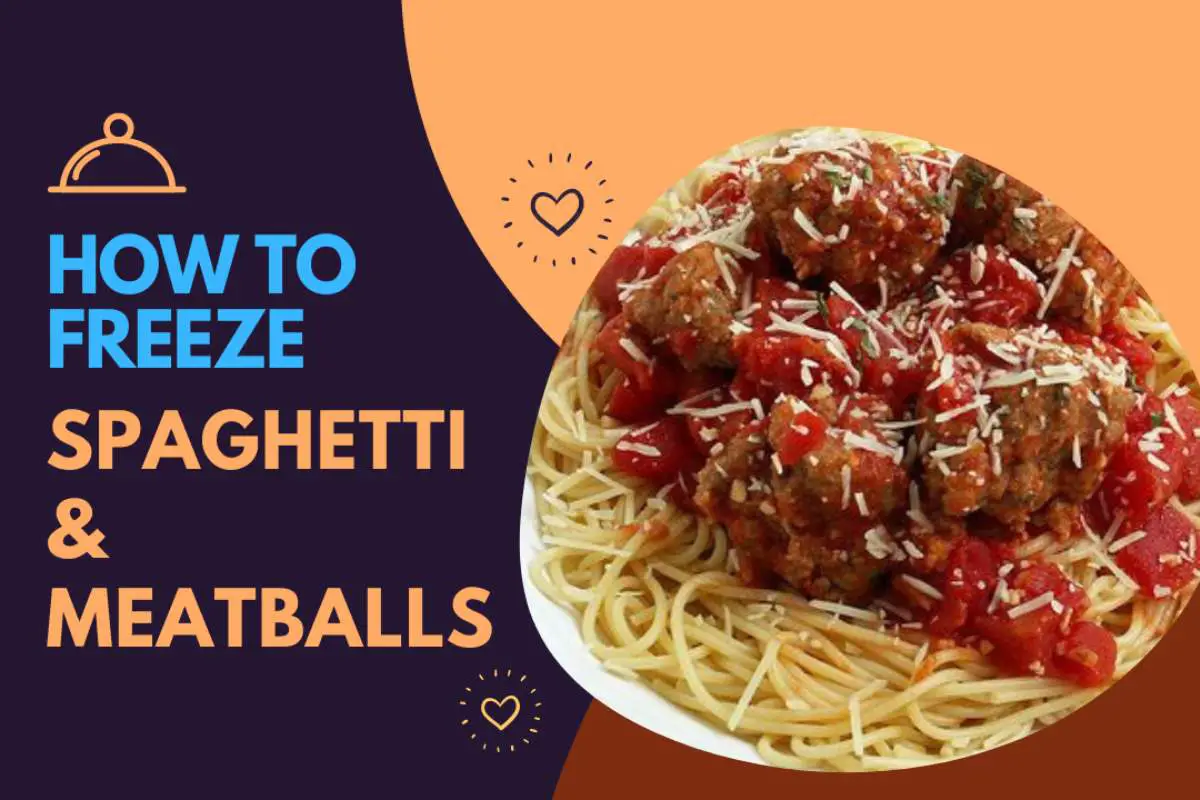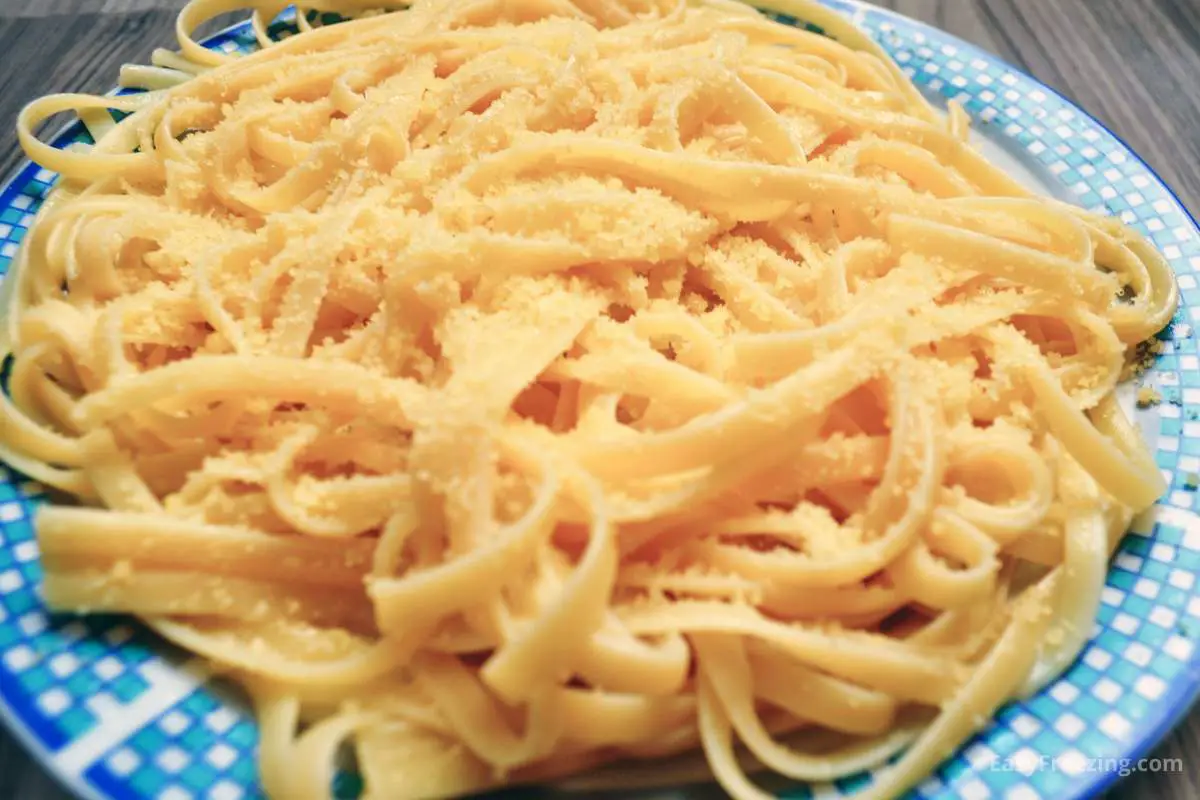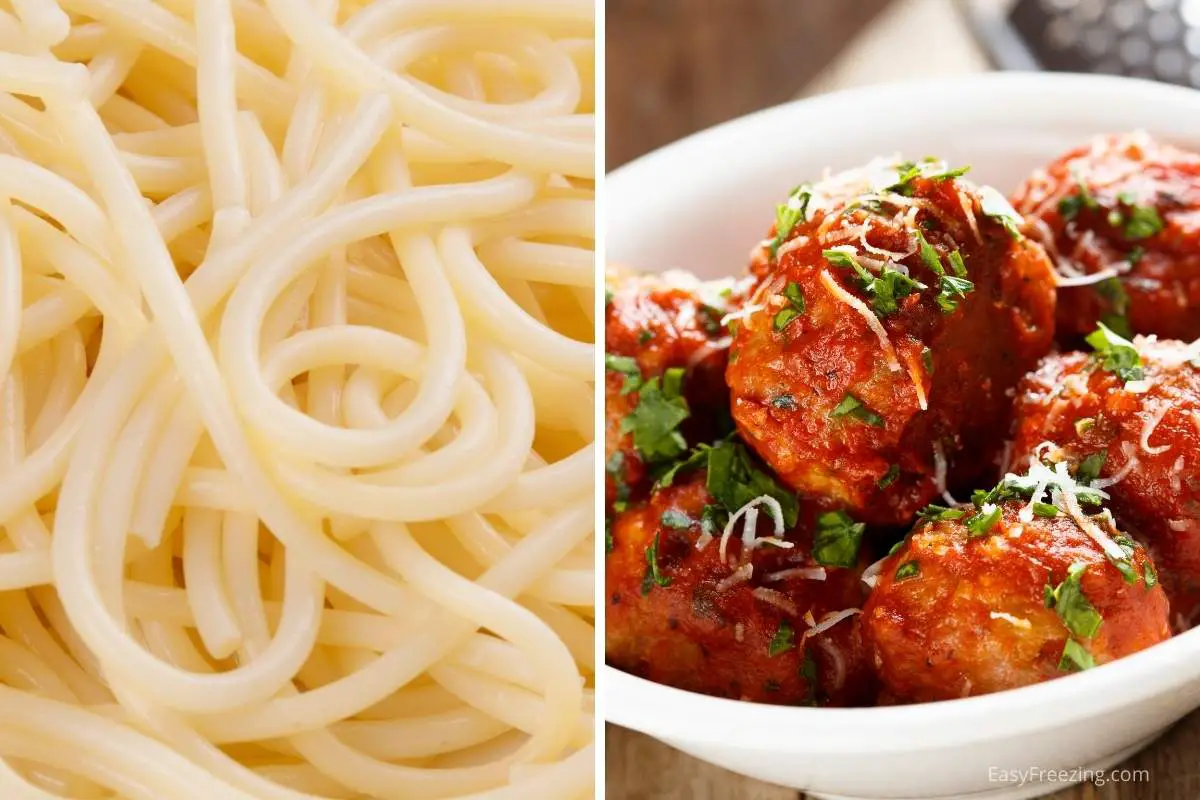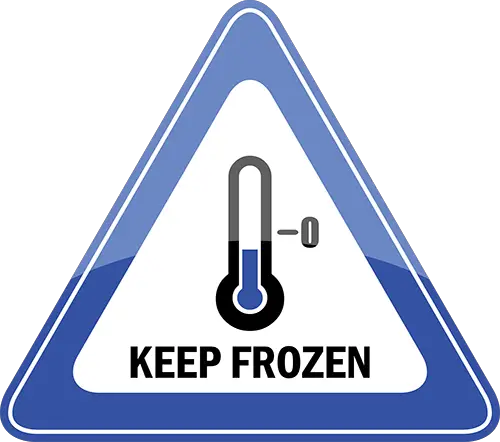Quick Guide to Freezing Spaghetti and Meatballs (How To)
When making a simple and delicious recipe such as spaghetti and meatballs, it’s easy to find yourself with plenty of leftovers. Luckily you can freeze spaghetti and meatballs for an easy meal later. Let’s explore how you can freeze leftover spaghetti and meatballs in the best way possible.

Can You Freeze Spaghetti And Meatballs?
Cooked spaghetti and meatballs can be easily frozen. I mean, everybody does it all the time, don’t they? Spaghetti and meatballs are even found in the frozen section in many supermarkets.
As long as you freeze it properly, you don’t have to worry about your cooked pasta with meatballs going bad. Keep reading as I dive into a few details so you can freeze your next batch of spaghetti and meatballs like a pro.
Do Spaghetti Noodles Freeze Well?

As far as frozen food goes, cooked spaghetti freezes exceptionally well. If stored correctly, frozen spaghetti can maintain its peak freshness for up to three months.
With that in mind, frozen spaghetti noodles can remain frozen and safe to eat almost indefinitely, although you can expect to lose some quality and flavor over time.
While you may not be planning to eat it over many months, you can enjoy your leftover spaghetti for that long with no problem.
Do Meatballs Freeze Well?
The great thing about freezing meatballs is that they freeze really well. Meatballs, whether cooked or uncooked, can remain as good as new for up to two months and are safe to eat, even delicious, for much longer. The same goes for meat sauce.
Should You Freeze Spaghetti Noodles And Meatballs Separately?
You can freeze spaghetti and meatballs (or meat sauce) separately, but you don’t have to. It can be convenient to separate them if you plan to use meatballs in other dishes. On the other hand, you can just as well freeze spaghetti with the meatballs. Either way, you should be fine.
How To Freeze Spaghetti And Meatballs
The steps to freezing spaghetti and meatballs are fairly simple. Whether you want to store frozen spaghetti with meatballs in the same container or store them apart is up to you; the freezing process is more or less the same.
Before freezing, let your spaghetti and meatballs cool to room temperature. Freezing still warm food affects it badly, and the excess moisture can result in ice crystals forming that will ruin the dish’s consistency.
Next, you will want to put the spaghetti and meatballs (together or separately) in a freezer-safe container. Airtight containers, Ziploc bags, and plastic freezer bags should do well, although the latter is always better for frozen food.
If you’re using a freezer bag, remove as much of the excess air as possible to avoid freezer burn before sealing it tightly.
Finally, you can place the container/s in the freezer and be certain they’ll make a great meal whenever you want them to. If you’re likely to forget about them for a long while, make sure you label and date the packaging.
Freezing Spaghetti And Meatballs Separately

If you don’t want to serve everything at once, you can store cooked noodles and meatballs separately, with or without mixing the pasta and sauce. The same process applies: let them cool to room temperature, place each in an adequate container, and freeze.
Again, if you’re using freezer bags, make sure you take out as much excess air as possible.
However, I’ll give you some pro tips to ensure that the spaghetti and meatballs stored stay fresh for a longer time.
Freezing Cooked Spaghetti
If you know beforehand that you’ll be freezing some of or all of your spaghetti for storage, consider cooking your noodles al dente, meaning not all the way through. As soon as the noodles are between tender and firm, which will take a couple of minutes, you can take out the portion to be frozen, drain its water, and let it cool completely before freezing it.
You can also add olive oil to prevent the noodles from sticking together. Some people add olive oil directly to the boiling water, which can be just as effective. Then, freeze it as you normally would.
By only partially cooking your spaghetti noodles, they will hold up even better in the freezer. Once thawed, you can cook your pasta noodles for a bit longer if you don’t like al dente noodles.
Freezing Cooked Meatballs
Once the meatballs or meat sauce are cooled, place them in freezer bags. If you prepared plenty of meatballs, it’s recommended that you divide them into serving-sized portions so you don’t have to take them out all at once.
If freezing your meatballs and sauce together, you can spread some olive oil inside the freezer bags so the sauce does not stain them. This will also make them easier to separate when thawing.
How Long Does Frozen Spaghetti With Meatballs Last?
If properly frozen, your leftover spaghetti and meatballs can maintain their best quality for 2 to 3 months. They can remain tasty to eat for much longer but will slowly lose their freshness over time.
Cooked pasta dishes are very freezer-friendly and can remain safe to eat for a very long time.
How To Thaw & Reheat Frozen Spaghetti And Meatballs
Now that we’ve seen the proper way to freeze pasta with meatballs let’s check how you should thaw and reheat your spaghetti and meatballs.
How To Defrost Frozen Spaghetti And Meatballs
The best way to thaw spaghetti and meatballs is by keeping them in the fridge to defrost overnight. This is the slowest yet most effective way to preserve the quality and texture of spaghetti and meatballs.
Alternatively, you can also thaw it directly at room temperature, particularly if you’re in a hurry. In this case, it is not recommended to re-freeze it as it will lose much of its freshness.
If too pressed for time, you can skip the thawing process and reheat it from frozen. This can cause the spaghetti noodles to dry out somewhat but works well in a pinch. You can add more cooked sauce and heat it a little more to overcome the dryness.
How To Reheat Frozen Spaghetti And Meatballs
Once the thawing is complete, you can choose whether to reheat it using the stove or oven. Reheating on the stove or in the oven is a straightforward process. Either way, it is always better to reheat spaghetti and meatballs at a medium-low to medium temperature. This will ensure that the entire dish is heated thoroughly.
You can also reheat your spaghetti and meatballs in the microwave. When using the microwave, ensure your spaghetti and meatballs are placed in a microwave-safe container and covered in plastic wrap.
Freezing Spaghetti and Meatballs – Final Thoughts
You can freeze your spaghetti and meatballs easily and in various ways. You can store them together or separately.
Spaghetti noodles and meatballs freeze very well and can retain freshness for several months. Following these simple procedures, you can freeze your leftovers and treat yourself to a nice pasta dish anytime.







